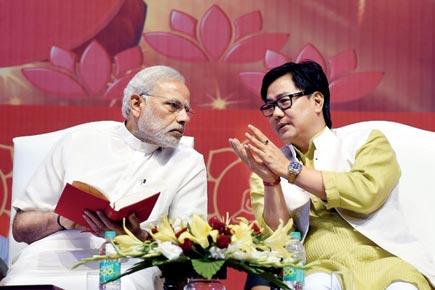To us Indians, democracy still means the right to vote. But we have problems accepting concepts like equality and dignity of labour


Union minister of state for Home Affairs Kiren Rijiju (right) took a potshot at filmmaker Anurag Kashyap yesterday, saying that people use PM Narendra Modi’s name to get into news. File pic/AFP
 A friend found his life turned upside down when his driver of many years, loyal, hardworking, trusted and well-rewarded, upped and left to become part of one of those app-based taxi services. The money incentive — an increase of between 50 to 100 per cent on current salary — was too much to match and it is unfair to stop anyone from reaching for a better life and better future. This is a story that will be repeated across India as aspirations and opportunities force us to accept democracy where it really works — in our personal lives, in our homes and on the streets.
A friend found his life turned upside down when his driver of many years, loyal, hardworking, trusted and well-rewarded, upped and left to become part of one of those app-based taxi services. The money incentive — an increase of between 50 to 100 per cent on current salary — was too much to match and it is unfair to stop anyone from reaching for a better life and better future. This is a story that will be repeated across India as aspirations and opportunities force us to accept democracy where it really works — in our personal lives, in our homes and on the streets.
ADVERTISEMENT
To us, democracy still means the right to vote. But we have problems accepting concepts like equality and dignity of labour. This is not just because of inherent discriminatory practices like the caste system or vestiges of leftover feudalism. While those exist and, unfortunately, may flourish, we also have to come to terms with divisions caused by money and ideas of class. Sociologists may argue that humans will always divide themselves into categories — inferior, superior and lack of acceptance. But even with those divisions, we sometimes lack the idea of dignity of another.
Nowhere in India does this become clearer than with the domestic worker, if only because almost everyone from the lower middle class upwards employs them. They are allowed into our homes. They may wash our clothes, cook our food, make our beds but they cannot sit on our sofas. They know it and we know it and that is our tragedy. We outrage on social media about people who take their maids and nannies to restaurants and make them stand or sit by themselves at other tables. But even as we outrage about the behaviour of others, we know that at home, we have separate plates and glasses for our domestics to use.
This same attitude follows for the service providers who come to our homes and without whom we would be lost, like plumbers, electricians and carpenters. We cringe with embarrassment at our own behaviour but we cannot change it. We offer ourselves the balm that domestic workers would not be comfortable with sudden offers of equality but actually we rarely have the courage to test that hypothesis.
Yet, there is always that contradiction. There is a relationship forged, there is shared pain, joy and experience. It is just at the exchange of physical things that we balk. We can discuss how much we hate our mothers-in-law but we cannot do it sitting together at the dining table over a cup of tea. For that, one of us sits on the floor and one of us stands.
It will change though and it will happen faster than we think. No domestic’s offspring is going to follow down that path if they can help it. They will find better jobs, more paying jobs and they will take their parents away. And if we want help at home, we will have to pay more for it. The word ‘servant’ will hopefully soon be applied only to government officials and elected politicians; but more on that later.
There’s some new research done by scientists at New York University, using Google Glass to track visual markers, which shows that ‘upper class’ people do not pay attention to the faces of those whom they consider socially inferior. The same research also shows that the waiter, whose face you don’t even bother to look at, does, in fact, look at you. Who has the advantage then, do you think? By considering yourself snooty, you are probably being both boorish and unprepared for the world around you.
On a slightly different note, let’s get back to that other aspect of democracy we still have to come to terms with: how our elected politicians perceive us — the people.
This is a very recent tweet from our minister of state for Home Affairs, Kiren Rijiju: “A new fashion has developed in India. A student or a film person can put a question or speak against PM without any logic to get into news.”
With due apologies sir, we, as the electors, have that right to question. And here I happily use the word ‘servant’, because it is their duty to respond and stand and serve while we sit. No?
Ranjona Banerji is a senior journalist. You can follow her on Twitter @ranjona. Send your feedback to mailbag@mid-day.com
 Subscribe today by clicking the link and stay updated with the latest news!" Click here!
Subscribe today by clicking the link and stay updated with the latest news!" Click here!







